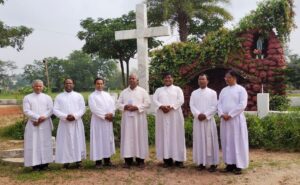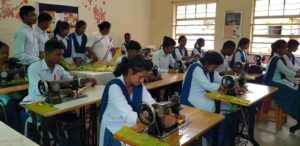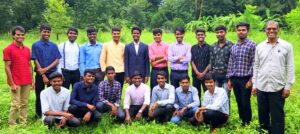EDUCATION
 The Madhya Pradesh Province has a network of 33 educational institutions (primary, middle, high and higher secondary) within the States of Madhya Pradesh and Chhattisgarh owned and managed by the Jesuits. Of the total active Jesuit personnel of the Province, 70% are engaged in primary and secondary school education. Most of the schools have adequate and spacious infrastructures. The majority of the schools have hostels with adequate facilities. The preference groups of the Province education service are the marginalized section of society. The majority of the beneficiaries belong to various tribal communities. Most institutions are located in rural areas and focus on serving rural communities. While the admissions are open to all, irrespective of caste and creed, the special preference is for the poor. Our schools aim at the human, intellectual and faith formation of students. Both the staff and the students come from multi socio-cultural backgrounds. Due to Jesuit institutions’ national and international fame, people have faith and trust in our educational institutions. Many schools also benefit from good collaboration by other Religious congregations.
The Madhya Pradesh Province has a network of 33 educational institutions (primary, middle, high and higher secondary) within the States of Madhya Pradesh and Chhattisgarh owned and managed by the Jesuits. Of the total active Jesuit personnel of the Province, 70% are engaged in primary and secondary school education. Most of the schools have adequate and spacious infrastructures. The majority of the schools have hostels with adequate facilities. The preference groups of the Province education service are the marginalized section of society. The majority of the beneficiaries belong to various tribal communities. Most institutions are located in rural areas and focus on serving rural communities. While the admissions are open to all, irrespective of caste and creed, the special preference is for the poor. Our schools aim at the human, intellectual and faith formation of students. Both the staff and the students come from multi socio-cultural backgrounds. Due to Jesuit institutions’ national and international fame, people have faith and trust in our educational institutions. Many schools also benefit from good collaboration by other Religious congregations.
Upholding the human person as an image of God, the Jesuit education service commits to imparting quality education to all, especially the poor, leading to an integral formation of persons with their cultural heritage, permeated with a deep faith in God, enabling them to become men and women for others, committed to establishing a society wherein prevail truth, justice, freedom, fraternity, love and peace.
PASTORAL CARE
Thanks to the Jesuit legacy in Chhota nagpur that missionary work started with the spread of the Good News of Jesus about a century and a quarter ago. From the very inception of the mission, faith has taken root among the tribals of the place. In parishes, Jesuit missionaries developed a system of pastoral care, creating and establishing different associations. Jesuits are managing 21 parishes and pastoral care centres; and nearly 30 Jesuit priests are involved directly or indirectly in evangelization. The homogeneity of the faithful and the priests serving them has a big advantage in understanding faith, deep rooted cultures and traditions, integrating it in the liturgy for the greater effectiveness and meaning. People’s deep faith expressed in the practice and participation in liturgies and sacraments, family prayers and devotions with many and good educational, social and cultural heritage, and celebration of traditional feasts and festivals is a witnessing factor that elicits vibrancy. There also exist cooperation, collaboration and contribution among the faithful for the cause of the parish and its development that unites the parish community. We Jesuit priests hailing from among the people are committed, enthusiastic, focused and passionate with our innovative ideas and means in spreading the Good News among the tribals and beyond, and trying our best to lift the people spiritually, socially, culturally and economically.
nagpur that missionary work started with the spread of the Good News of Jesus about a century and a quarter ago. From the very inception of the mission, faith has taken root among the tribals of the place. In parishes, Jesuit missionaries developed a system of pastoral care, creating and establishing different associations. Jesuits are managing 21 parishes and pastoral care centres; and nearly 30 Jesuit priests are involved directly or indirectly in evangelization. The homogeneity of the faithful and the priests serving them has a big advantage in understanding faith, deep rooted cultures and traditions, integrating it in the liturgy for the greater effectiveness and meaning. People’s deep faith expressed in the practice and participation in liturgies and sacraments, family prayers and devotions with many and good educational, social and cultural heritage, and celebration of traditional feasts and festivals is a witnessing factor that elicits vibrancy. There also exist cooperation, collaboration and contribution among the faithful for the cause of the parish and its development that unites the parish community. We Jesuit priests hailing from among the people are committed, enthusiastic, focused and passionate with our innovative ideas and means in spreading the Good News among the tribals and beyond, and trying our best to lift the people spiritually, socially, culturally and economically.
 The strengths of the social service are that there is a vast space of tribal context in which the Jesuits have been working for several decades from different social centres. Some of these centres are well established with community support. We Jesuit social workers are rooted in spirituality, well qualified and trained, committed, experienced, and above all, we are the sons of the soil, rooted in tribal-ness. There is strong networking, collaboration and connection with Jesuits, Government Organizations (GOs), Non-Government Organizations (NGOs) etc.
The strengths of the social service are that there is a vast space of tribal context in which the Jesuits have been working for several decades from different social centres. Some of these centres are well established with community support. We Jesuit social workers are rooted in spirituality, well qualified and trained, committed, experienced, and above all, we are the sons of the soil, rooted in tribal-ness. There is strong networking, collaboration and connection with Jesuits, Government Organizations (GOs), Non-Government Organizations (NGOs) etc.
Envisioning a dynamic, egalitarian and empowered community with rightful dignity and justice, we, the Jesuits in Social Action, reaffirm “Our commitment to following the poor Lord quite naturally makes us friends of the poor” (Ignatius’ letter to Jesuits at Padua on August 6, 1547) in a more complex social context. United in “faith that does justice”, we pledge to accompany and collaborate with the marginalized, excluded, discriminated and dispossessed from their jal-jangal-jameen and livelihood, socio-political, economic and cultural rights and justice, preferentially the indigenous peoples and communities – tribals (especially Barelas, Baigas, Gonds, Korwas, Kodakus, Kharias, Majhis, Majhwars, Mundas, Nagesias, Oraons, Pandos), and Dalits (especially Gandas (Chauhans), Ghasias (Sarthis), Lohars, and Satnamis). We uphold their traditional systems of governance, socio-cultural values and their wisdom of caring for a “Common Home” through an alternative sustainable development process. Rooted in our Jesuit identity and spirituality, we network with like-minded persons, civil societies, peoples’ organizations and movements that share the struggles and aspirations of the poor through the rights-based process of the Pedagogy of the oppressed. We also uphold the Constitutional values that safeguard all citizens’ integral liberation, especially our preference communities. All these commitments are accompanied by adequate research and documentation.
JESUIT FORMATION
 Vocation is a gift of God inviting us to labour with Him in His vineyard to establish the Kingdom of God. It calls for responsible nurturing and care in promoting a genuine response to the call received. Living examples and committed involvement in various services by the Jesuits inspire young people to dedicate themselves as Companions of Jesus. We resolve to provide a quality and integral formation by providing the best opportunities for physical, intellectual, psychological, emotional and spiritual growth. We instil in them our Jesuit legacy and a deep respect for the indigenous culture and religion. We endeavour to form our young Jesuits in the school of faith, prayer, Discernment and Spiritual Exercises to enable them to walk in the footsteps of Christ. We accompany them in their inner transformation for fruitful engagements in various apostolates with the spirit of Magis. We provide opportunities for socio-cultural analysis and involvement during the course of formation.
Vocation is a gift of God inviting us to labour with Him in His vineyard to establish the Kingdom of God. It calls for responsible nurturing and care in promoting a genuine response to the call received. Living examples and committed involvement in various services by the Jesuits inspire young people to dedicate themselves as Companions of Jesus. We resolve to provide a quality and integral formation by providing the best opportunities for physical, intellectual, psychological, emotional and spiritual growth. We instil in them our Jesuit legacy and a deep respect for the indigenous culture and religion. We endeavour to form our young Jesuits in the school of faith, prayer, Discernment and Spiritual Exercises to enable them to walk in the footsteps of Christ. We accompany them in their inner transformation for fruitful engagements in various apostolates with the spirit of Magis. We provide opportunities for socio-cultural analysis and involvement during the course of formation.
VOCATION PROMOTION

In the context of increasing apostolic demand, availability and greater effectiveness in the challenging and complex socio-political scenario, we do realize the need for more, better and quality human resources today. The opportunities for quality apostolic intervention in Madhya Pradesh and Chhattisgarh are wide open, inclusive of diverse social, cultural and religious realities. Hence, we are consciously committed to promoting good and more vocations for the Society of Jesus to collaborate with the “labouring God”. Our efforts to promote vocations through Apostolic Schools, youth and pastoral works have been yielding sufficient fruits of vocation in the Society of Jesus. A full-time vocation promoter, along with two Apostolic Directors and the youth director, plans out various methods and strategies to promote vocations in schools, colleges and parishes within the state and all over the country. The Society of Jesus strives to promote new members who are with sufficient and mature Catholic faith conviction, generosity, God-oriented and other-oriented dispositions, sound intellect and abilities. In other words, they are expected to be competent and endowed with basic human qualities as per the requisitions of the Constitutions and Norms of the Society of Jesus.
SOCIAL COMMUNICATION
We, the Jesuits engaged in Social Communication, realize that social media provide unlimited potential for expanding our outreach in the apostolate of evangelization. We believe that the innovative and creative use of multiple types of media can assist people in their encounter with Jesus, the Kingdom values and faith traditions of socio-cultural realities in life. We recognize social communication as a gift of God for apostolic purposes of the Society. Hence, we pledge ourselves to spread the message of the Church, which invites us in today’s context because “it is, therefore, important to know how to dialogue and how to enter, with discernment, into the environments created by new technologies, into social networks, in such a way as to reveal a presence that listens, converses and encourages” (Pope Francis to the participants in The Plenary Assembly of the Pontifical Council for Social Communications on 21 September 2013). “We want to be focused, urgent, passionate and strategic in our communication … and with a real sense of mission,” is the call of Fr. General Arturo Sosa. He further reminds us that “communication is in our DNA”. “For St. Ignatius it was almost an obsession”. If our mission is to “go out to the whole world and proclaim the Good News” (Mk 16:15) we must communicate. Therefore, rooted in our Christian and Jesuit traditions, we resolve to converse and walk with the people communicating and reaching out to the masses, upholding truth and human dignity with mutual respect as children of God.
DIALOGUE
We, the Jesuits in the Dialogue Apostolate, believe that all the people of India, irrespective of caste and creed, are children of one God. We are ready to dialogue with one another in the spirit of spiritual discernment, reconciliation, collaboration and networking. Dialogue with people of other faiths is a key dimension of the Jesuit commitment to be companions of Jesus and servants of His mission. It is to live alongside people of other faiths, acting as good neighbours to them and being prepared for the common good. The Province is home to several religions and cultures – Buddhism, Hinduism, Islam, Sikhism, Jainism, Sarna, Christian denominations, etc. Hence it is immensely important for the Jesuits of the Province to get involved in the dialogue. “For us Jesuits, dialogue with people of other faiths expresses itself through the dialogue of religious experience – learning how to listen to what others are saying and enter into their spiritual lives through prayer and conversation” (Jesuit Conference of Asia Pacific, https://jcapsj.org/what-we-do/interreligious-dialogue/). We acquire the spirit of wisdom ‘to listen with an open heart, to understand with an open mind and to speak with humility and sincerity, and be granted the grace of indifference. In all our works, we may be inspired by the Holy Spirit and may fulfil God’s Holy Will’ (GC 36 Morning Prayer on November 10, 2016, Ignatian Hints for a Fruitful Dialogue). We commit ourselves to building a harmonious human community founded on respect, dignity, freedom and spiritual values with people of other faiths and cultures.
YOUTH
We have well-organized associations like Yuva Sangh, Christian Life Community (CLC), All India Catholic University Federation (AICUF), Jesus Youth and Crusveer. Our institutions and parishes have a large number of tribal youth under our care. Our youth programmes enjoy good collaboration and networking with the laity, diocesan clergy and Religious congregations. We have many young people who are in various jobs as our partners in youth service. Link is created with the tribal youth in different states through activities of AICUF, Aadivasi Yuva Chetna Manch (AYCM) and Jesuit Youth Ministry in South Asia (JYMSA) etc. We have a large number of motivated lay teachers and animators in CLC and Crusveer movements. Our youth apostolate enjoys the patronage of the Archbishops and Bishops.
We, the Jesuits involved in the Youth Service, commit ourselves to accompany and nurture the young people “in the creation of a hope-filled future”. The young people render a great service to the Church that cannot be undermined. “Young people speak to us and challenge us; they make us realize the lights and shadows of our community, and with their enthusiasm, they encourage us to give responses in keeping with our times. They are God’s new fertile soil that God gives to Christian communities” (Pope Francis to the participants in the 20th Latin American Meeting of Youth Pastoral Leaders (Lima, 18-23 November 2019), 19.11.2019). They need our accompaniment to quench their spiritual thirst and prepare themselves for the service and mission of Christ. Energized by His Spirit, they can become witnesses of faith, hope, love, reconciliation and justice for the whole of humanity, with a preference for the marginalized and downtrodden who are affected and afflicted by social, political and religious unrest and struggles.
IGNATIAN SPIRITUALITY
The Jesuits engaged in the Ignatian Spirituality Service have a solid Ignatian base. They regularly give Spiritual Exercises to various groups. We have Sadhanalaya, Pathalgaon to promote Ignatian spirituality. We have some trained Jesuits in Ignatian Spirituality. We have many Jesuits who have sufficient experience in preaching Ignatian retreats. We have scholastics and novices available for preaching retreats in villages. We use social media to promote Ignatian Spirituality.
We, the Jesuits involved in the Ignatian Spirituality Apostolate, resolve to impart the dynamics of the Spiritual Exercises to the faithful, Religious and clergy. We seek to help people hear Christ’s voice more clearly and find God in all things. We commit ourselves to deepen our relationship with God through constant contemplation, meditation, retreat, discernment and Examen. We also focus on the poor, tribals, marginalized, youth, women and children to transform them into agents of reconciliation, faith and justice.

SOCIAL ACTION